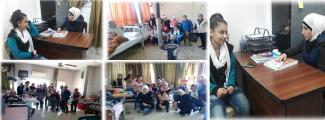Displaced from Sitt Zeinab, 15-year-old Rahaf currently lives with her family in Jaramana. The girl was introduced to the CC through an ORV team who accompanied her and her mother thereto, where Rahaf enrolled in educational support programs and registered, along with her mother, in the Hear My Heart Program for women.
Rahaf committed herself to the CC, and after a while the sister-facilitator noticed scars and wounds on the girl's arm and hand, which necessitated an urgent referral.
I met with the mother and talked to her about her daughter's behavior. She said Rahaf has lately regressed a lot in her study and failed in her class. She tended to sit alone most of the time, became violent in dealing with her siblings, beating and yelling at them more often. Furthermore, in the area where the family lived, violence of all sorts and self-harm was common and the child must have seen that very often.
The mother mentioned that, on one occasion, she had an argument with her daughter. So Rahaf went to an abandoned place close to the house. When the mother followed her, she saw her cut her hand with a piece of broken glass without showing signs of pain or crying. Then the mother beat the girl violently.
At that point, we met Rahaf and tried to build with her a relation based on trust. After several sessions, the girl opened up and talked. She said she had been hurting herself for two years now, that she used various tools to wound her hands (a mirror fragment, a blade, a knife, etc.) and that she acted that way to discharge anger. "I feel relived when I see blood," she said. She further added she had seen people hurting themselves in her neighborhood, and those persons were a source of trust and safety for her.
The first thing we did was proposing a feeling identification exercise to the girl in order to determine the emotions and situations that drove her to this kind of destructive behavior. It turned out that anger and loneliness were behind her perversity. In fact, Rahaf had no friends, often sitting in the park on her own.
We discussed with the girl about the body's worth and the respect with which it should be treated. We further developed a joint plan to look for alternative solutions whenever she felt the need to harm herself (such as a vigorous activity, punching a pillow, pressing the stress ball, tearing up and littering a sheet of paper, showering with cold water, etc.). We gave her some simple tools like rubber balls and a sketch book.
We also focused on positive self-talk. We wrote down with Rahaf a list of good qualities she had and good actions she did. Reflecting upon her gifts and talents, it turned out that she liked volleyball and was in fact good at it. With her parents' approval, we enrolled Rahaf in the sports club which is held in one of the district's schools, and Rahaf now spends quality time in training. She was also integrated into the Small Steps campaign so she could talk about street risks and behaviors to avoid.
Along with individual sessions, Rahaf was integrated into the Mentoring Program to form a circle of friends around her. The accompanying sister said that Rahaf was well integrated with her friends and participated in the activities and the selection of topics.
The Mentoring Program group participated in a visit to Dar al-Karama (a center for the care of the elderly and people with special needs). The group held a joint activity with the center inmates. Rahaf's interaction during the activity was remarkable and, with some inmates, she performed a musical activity before the end of the visit.
During a session with the girl after the visit, she said that the elderly and those people with special needs gave her a great strength and motivation to learn about her self-worth and the importance of having a caring family around her that takes care of her. She decided she would never hurt herself again, that she would use from now on healthy ways to relieve her anger and irritability. We were thrilled with Rahaf's progress and we accompanied her to a dermatologist to get a restorative treatment.
Rahaf's mother talked to us about the amazing change in her daughter's behavior, particularly in treating her siblings and herself personally. Rahaf had definitely become gentler and calmer.
Rahaf's individual sessions have stopped now, but she still participates in the Mentoring Program under our care and constant attention.

